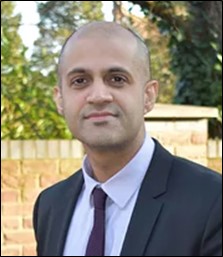Call to people living with diabetes – ‘Don’t wait to be contacted – book your free flu and Covid jabs’
People living with diabetes have a higher risk of becoming seriously ill if they get flu or Covid-19, and vaccines are the most effective way to prevent that happening, the NHS medical director for primary care in the North East and Yorkshire says.
You don’t need to wait to be contacted to get vaccinated and can boost your immunity this winter by booking your free flu and Covid-19 jabs today at www.nhs.uk/wintervaccinations, says Dr Faisel Baig, GP and Medical Director for Primary Care, NHS England – North East and Yorkshire (pictured).

“This winter NHS services are under significant pressure, with challenges to timely admission and discharge of patients,” Dr Baig says. “In recent weeks, the NHS has seen a rapid increase in hospital admissions for flu, Covid-19 and other respiratory illnesses.
“People living with diabetes of all types are more at risk of getting the flu and at greater risk of severe illness from it. They are also more at risk of complications from the Covid-19 virus. So I would urge them to get their flu and Covid jabs to protect themselves this winter. It’s not too late, with appointments available in the coming days including evenings and weekends.”
You can book your free flu and COVID-19 vaccinations by visiting www.nhs.uk/wintervaccinations by calling 119 or visit your local pharmacy. Healthcare professionals, too, can help keep themselves and their patients safe this winter by getting the free flu and Covid vaccines.
Dr Baig’s reminder to people in the North East and Yorkshire who are living with diabetes to get protection against serious illness comes as latest NHS figures show flu cases in England jumped by 47% in the week up to 1 January, with more than 5,100 people in hospital with flu. In the same week in 2021 there were just 38 flu cases in NHS hospital beds.
In the face of this unprecedented pressure and demand on its services, the NHS has planned extensively for winter, recruiting hundreds of extra 111 and 999 call handlers and establishing control centres in every area to manage demand as effectively as possible.
